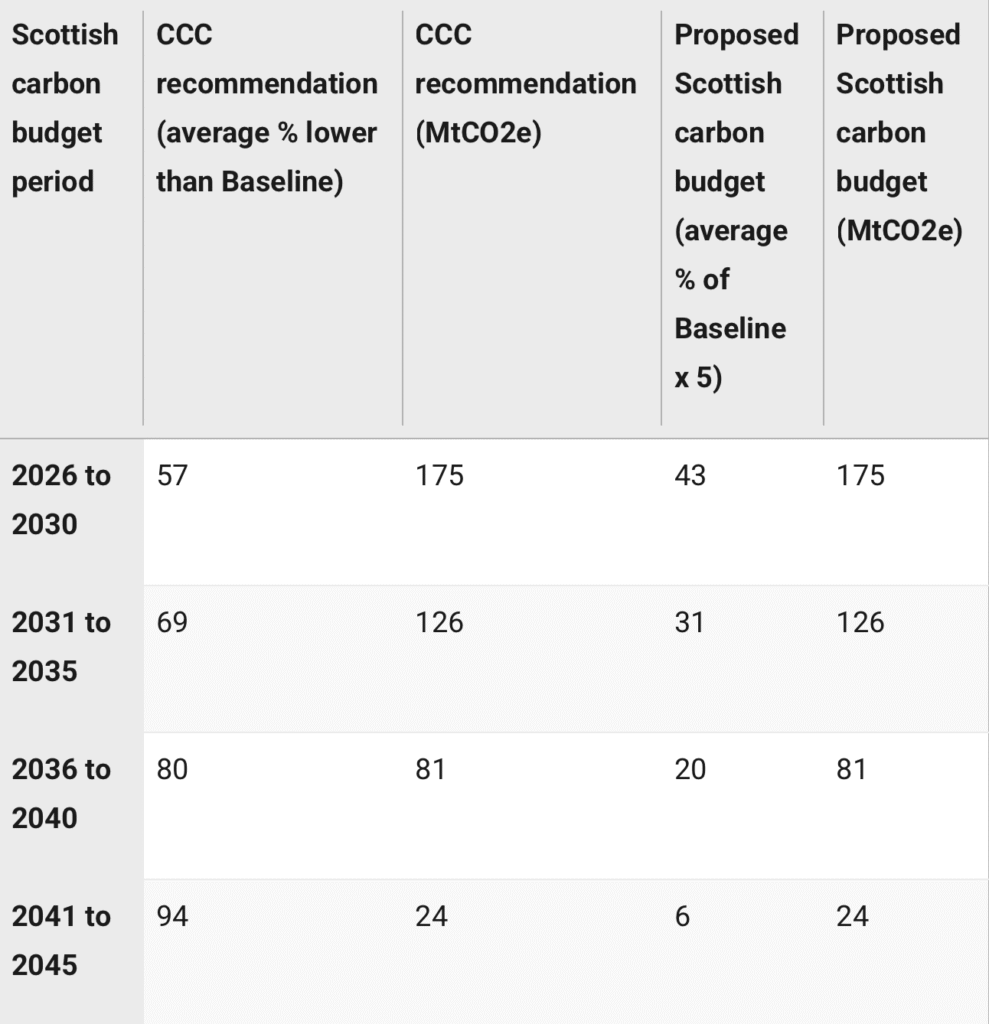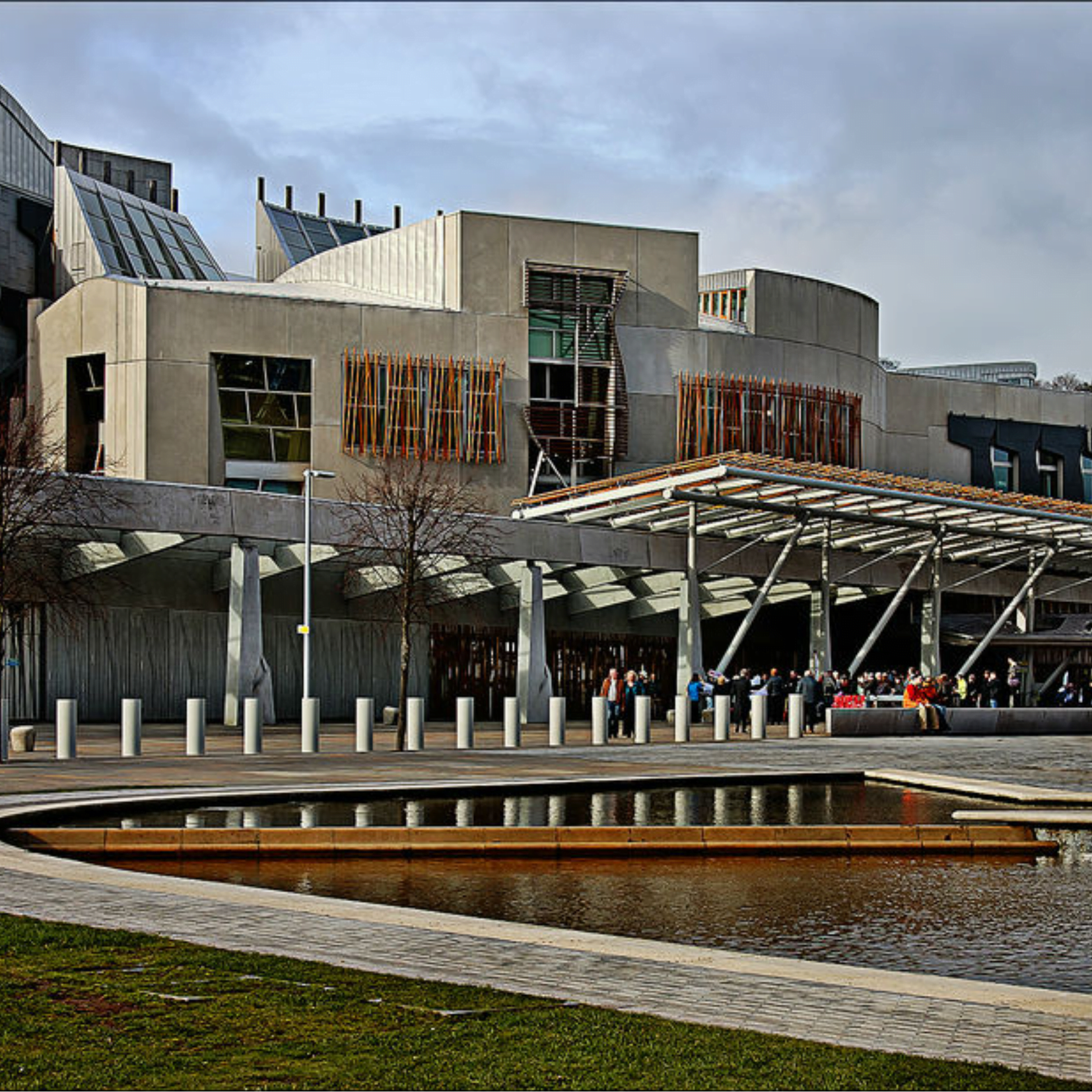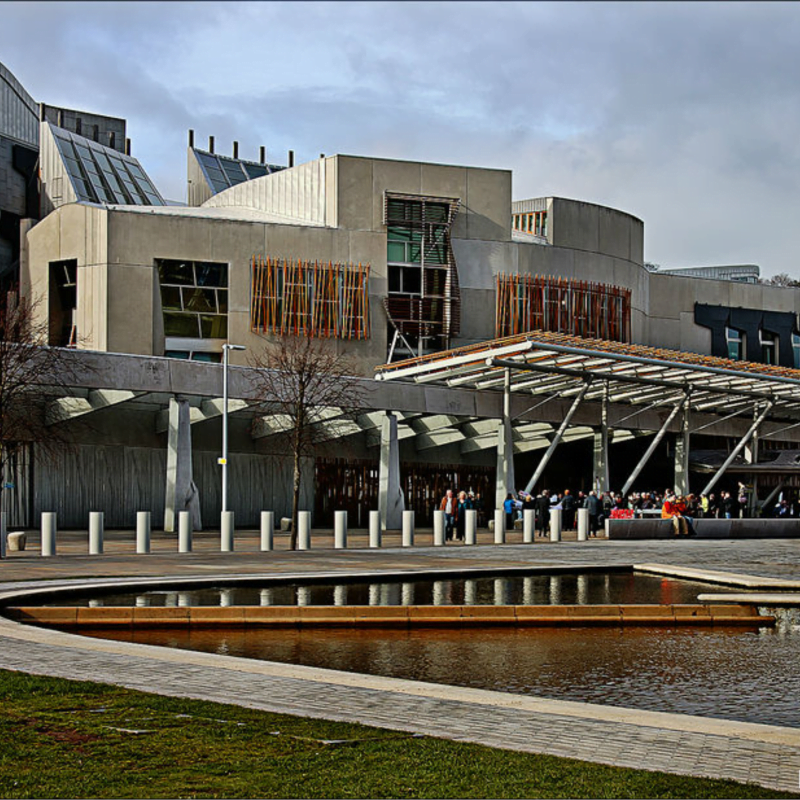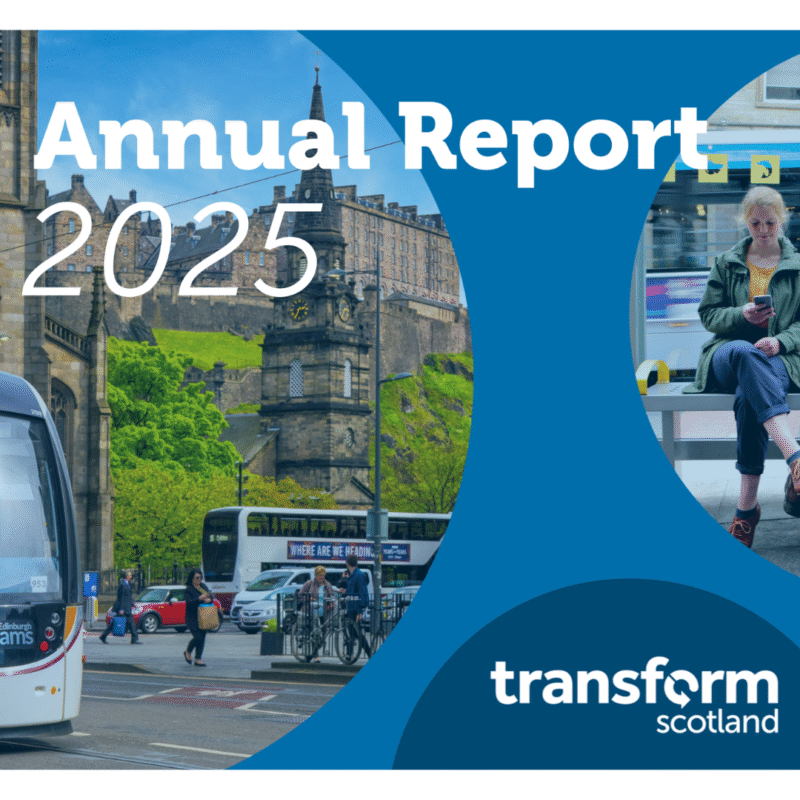Policy Advisor Jamie Wallace critiques the Scottish Government’s draft Climate Change Plan.
The Scottish Government is committed to producing a draft Climate Change Plan before the end of the year, covering the period 2026-40. It will be the first plan to be published in the context of a new system of five-year carbon budgets.
Will the plan show the leadership needed to deliver sustained and steep carbon reductions, or will it use the new budgets regime to punt reductions into the future, under the cover of ‘not in our term of office’ thinking, or fantastical ‘direct air carbon capture’ techno-fixes?
The Climate Change Committee has set out the following recommended carbon budgets for each of the five-year periods. This shows the scale of the challenge.

The elephant in the room
The transport sector, accounting for nearly a third of net Scottish emissions in 2023, plays a vital role in ensuring the nation stays within its budget.
Given domestic transport’s out-sized contribution to climate emissions, the lack of real progress in delivering reductions, and rising emissions from international aviation and shipping, the time for action is now. This thistle must be grasped.
Scotland’s overall emissions reduction has been delivered through the dramatic decarbonisation of our electricity supply. They have also been flattered by a process of de-industrialisation, and the off-shoring of emissions – gains that will not be repeated. The failure to deliver significant reductions in both domestic and international transport will become evermore stark and therefore must be the focus of concerted government action.
A detailed delivery plan for a reduction in car kilometres
As repeatedly emphasised by the likes of the Climate Change Committee, technological fixes alone will not deliver sufficient reductions in carbon emissions from road transport. The Scottish Government must persist with a plan to deliver a reduction in kilometres driven. All road building and widening schemes should be reviewed in order to demonstrate how they will prevent an increase in car km.
Given diminishing revenues from fuel duty through the ongoing electrification of the road vehicle fleet, the Scottish Government should analyse how road user charging could maintain revenues from the road transport sector, lead to more efficient use of the existing road network and help deliver car km reduction targets. The government must make a clear statement regarding the extent of its powers to implement road user charging, as well as if and how it needs the cooperation of the UK government.
Incentivising the switch from private to public transport

The Scottish government must counter the notion of the ‘war on the motorist’. For decades, the increase in the cost of motoring has been far exceeded by the relative increase in the cost of bus and rail travel. Affordability tests need to be woven into transport decision-making to ensure that the costs of private versus public transport are equalised, and public transport options are demonstrably cheaper where possible.
The full suite of policy measures around speed limits, road re-allocation, traffic calming measures, smart and multi-modal ticketing, bus prioritisation and differential parking charges all need to be enacted at pace – where necessary providing local government with the policy levers and funding to deliver them.
Zero emission road transport
The government must continue to support the rapid transition to zero-emission transport. Policy incentives should include the introduction and widening of low and ultra-low emission zones in areas with higher air pollution, guidance and incentives to support local authorities’ introduction of parking zones and policies that favour smaller, lightweight, zero-emission vehicles, and funding and regulatory measures to speed up the conversion of bus and lorry fleets to zero-emission standards.
Carbon budgets for aviation
International aviation and shipping have shown a 33% increase in emissions since 1990 – the sole sector to have increased its emissions since 1990. The sector is projecting high levels of growth being compatible with climate change targets based on ‘sustainable’ aviation fuel. The aviation sector should be required to operate within strict carbon budgets that preclude growth unless it can demonstrate the use of fully sustainable aviation fuel, and transparent and auditable supply chains.
A re-framing of costs and benefits
Costs need to be calculated in their broadest sense. There are huge short, medium and long-term costs associated with inaction. Absent or relatively expensive public transport prevents many parts of society making full economic or social contributions to Scotland’s future. Poor air quality and obesogenic environments place extra pressures on an already stretched health service. Failure to tackle dangerous driving ruins the lives of countless families.
There are multi-billion pound costs associated with the government’s current road programme which must not be justified on the basis of avoiding spurious costs such as ‘driver frustration’. There are well-versed and tangible health, economic and social benefits to broadening the affordability of public transport and enabling active travel, and it is inexcusable to dream up ‘benefits’ of road building to allow schemes to pass assessment tests.
Bolder and better communications
There are considerable challenges in ‘selling’ these policies to the public should the climate narrative be lost to deniers and polarising influencers. Communicating the imperative of climate change action in a media environment where vested interests pursue short-term gain over long-term societal wellbeing will demand strong political leadership. The public must understand the real threats: failing food supply chains, mass intercontinental migrations, extreme water scarcity, escalating damage from extreme weather events, uninsurable risks proliferating across wide sections of the economy.
On the flip side, improving the scope and affordability of public transport widens the social and economic potential of those living in transport poverty. Enabling active travel improves health outcomes. Making frequent flyers and SUV drivers pay the full cost of their activities provides revenues for wider social benefit. Implementing intelligent road-user charging which imposes more costs on the hyper-mobile and allows for efficient use of the existing road network, will both create revenue and free up budgets to support wider social benefit.
Leadership on the world stage
At exactly the time when climate science is both showing and projecting some of the most damaging consequences of inaction, the rhetorical and policy response is completely at odds with the redoubling of effort required to deliver the requisite mitigation strategies.
Scotland must be a strong voice on the global stage, making the environmental, social, economic and moral case for sustained action on climate change. This should involve ‘coalitions of the willing’ with other nations, to demonstrate how carbon mitigation and adaptation strategies can build stronger, more resilient and fairer societies. Best practice sharing, supply chain building and joint research and development projects, within and outwith Scotland, will be critical to deliver on extremely stretched carbon reduction targets.
Within the context of avoiding costs and widening benefits, politicians and businesses will have greater room to introduce the bold measures needed to make the Climate Change Plan work. Demonstrating with clarity that strong action on climate mitigation in transport can go hand-in-hand with tackling transport inequalities and wider social justice issues will take great political skill and nerve. Without such political leadership, the plan will fail.
Turning commitment into action
Scotland’s 2045 net zero target is achievable, but only if the Scottish Government translates intent into action. First, the Scottish Government must lock in a strategy to reduce car kilometres travelled, with a full review of all road building and widening projects. At the same time, it should reject the tired rhetoric of a “war on motorists” by clearly demonstrating the benefits of cleaner, smarter, more affordable transport for all.
Incentivising the shift from private to public transport and active travel is essential. That means accelerating the rollout of low and ultra-low emission zones, introducing parking and vehicle policies that favour smaller, zero-emission vehicles, and ensuring robust funding for greener transport infrastructure. The aviation sector must not be given a free pass. Carbon budgets should be enforced, with any growth contingent on the real, verified use of sustainable aviation fuel.
Expanding access to affordable, reliable public transport tackles transport poverty, unlocks opportunity, and supports public health. A fairer system, where the costs of high-emission lifestyles are internalised through road-user charging and targeted levies on frequent flyers and SUV drivers, can also generate the funds needed to invest in a just transition. The path to 2045 demands political will, policy coherence, and public trust. With a focus on these delivery priorities, the Scottish Government can lead the way to a cleaner, fairer, and more sustainable transport future.





